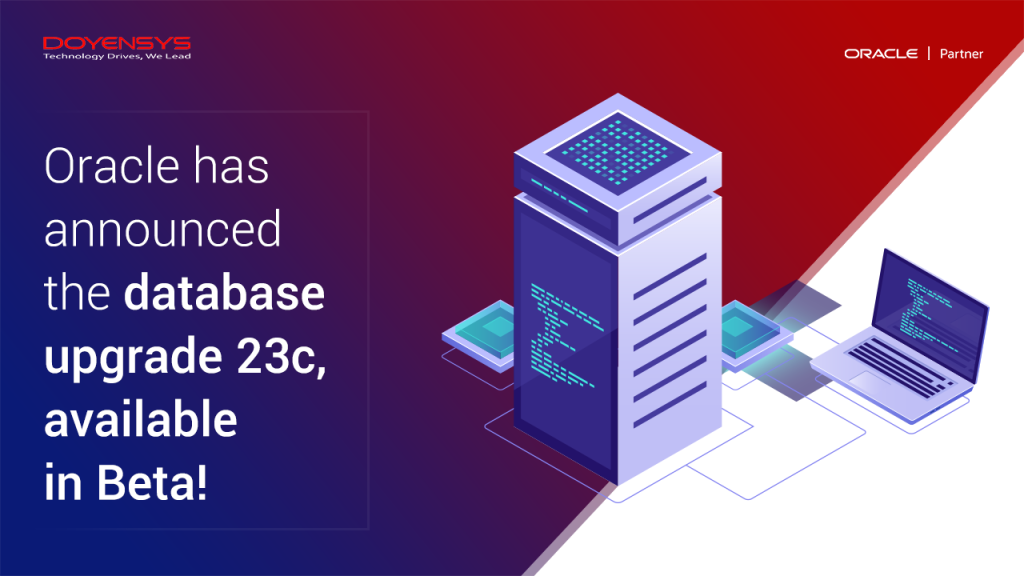The Oracle Database 23c beta release is now available, giving customers of the company’s namesake relational database technology a sneak peek at new features that enhance data management, performance, and security.
The new beta release, unveiled in October at the Oracle CloudWorld 2022 event in Las Vegas, is the first significant update to Oracle’s database since the milestone Oracle Database 21c was published in January 2021.
Applications and development are simplified in Oracle Database 23c, known as “App Simple.” Oracle continues to lead the industry in terms of performance, security, and availability for mission-critical workloads having several new developments across its widespread database services and products.
 Oracle upgrades – what’s new?
Oracle upgrades – what’s new?
So, what does the new Oracle update- Oracle 23c introduce? For the apps that are created using JSON, Graph, or microservices, Oracle Database 23c “App Simple” delivers cutting-edge new capabilities that enable breakthrough developer productivity. Furthermore, SQL is improved to make it easy usage, and JavaScript is added as a language for stored procedures.
As an illustration, Oracle Database 23c addresses the discrepancy between how applications describe data & relational databases store data by introducing a ground-breaking new solution called JSON Relational Duality.
By enabling data to be used as relational tables and application-friendly JSON documents, JSON Relational Duality streamlines the creation of applications. New types of data, such as JSON and Graph, new types of analytics, such as machine learning, and new development approaches, such as microservices, are used to create modern apps.
Modern applications use a wide range of data technologies for creating and maintaining apps more challenging. Oracle Database 23c’s ‘App Simple’ delivers game-changing new features that make the development and operation of these contemporary apps noticeably simpler.
Oracle also unveiled Oracle Database Zero Data Loss Autonomous Recovery Service to improve data security for vital Oracle Database services on Oracle Cloud Infrastructure (OCI), empowering businesses to combat ransomware, outages, and human error successfully.
Besides this, Oracle unveiled Oracle Full Stack Disaster Recovery Service, enabling users to configure, monitor, and manage the disaster recovery procedure for the entire stack of technologies used to create applications, including middleware, databases, networks, storage, and computing, from the OCI console.
What does the Oracle 23c bring?
To help programmers create the next generation of mission-critical, high-performance database systems, Oracle Database 23c introduces additional capability. As it continues to offer new features, the 23c update will make Oracle users feel at ease in deciding on the Oracle platform for their database.
Users will particularly benefit from the 23c database update in terms of a rolling patching capability that will help minimize potential system downtime. Improved privileges at the schema level were introduced by Oracle, which enhances access control.
JSON relational duality
For years, Oracle database has supported JSON as a data format. JSON relational duality’s fundamental tenet is to integrate JSON with Oracle’s relational data model. Developers can use the JSON syntax and API using the JSON relational duality capability. Additionally, it enables access to JSON data using the entire set of SQL queries for database administrators.
JSON doesn’t need the developer to consider the data model, which is one of its perks. With JSON, programmers can focus on the functional side of an application and write the code based on that viewpoint without first requiring a schema.
The ability to store JSON data as relational database tables is provided by JSON relational duality. Then, on top of the relational tables, Oracle Database 23c offers users a JSON view.
Graph capabilities
Oracle is now giving its relational data model support for graph data. The graph has previously been supported by Oracle as a different data type. However, it is now more thoroughly integrating graphs with the Oracle Database, just like it is doing with JSON. Users can now create graph data on top of database tables thanks to version 23c.
There are numerous possible uses for the capacity to overlay a graph data model on top of already-existing relational table data, such as real-time fraud detection. The SQL Property Graph Query Language, which aids programmers in creating graph applications, has also gained support from Oracle.
Other Oracle 23c features:
With a new JSON relational duality, Oracle has also announced the rollout of a series of database innovations to simplify development with 23c. They include –
1. Oracle Database API for MongoDB
Oracle Database for on-premises deployments now offers MongoDB compatibility through the Oracle Database API for MongoDB. The API enables MongoDB developers to migrate existing MongoDB workloads to Oracle Database without changing their applications & to design and run new MongoDB applications on Oracle Database using the tools, drivers, and frameworks that they are accustomed to using for MongoDB.
2. GoldenGate 23c
GoldenGate 23c adds new features that enhance usability, performance, diagnostics, and security and is certified with Oracle Database 23c and earlier versions. Highlights include the improved JSON replication efficiency and new replication support for blockchain & immutable tables. The application patching uses edition-based redefinition without a break in service.
OCI GoldenGate supports more than 40 additional data connections from Oracle and non-Oracle sources across multi-cloud settings, including AWS and Azure & new Stream Analytics for continuous data integration and data-in-motion analytics.
3. GoldenGate Free
GoldenGate Free can turn potential users, clients, developers, and students to use GoldenGate, its updated user interface, and the fully automated replication lifecycle without cost. It’s intended for source or target databases that are 20GB or fewer in size hosted on OCI, other clouds, or on-premises for development, DevOps, testing, or production.
4. Autonomous Data Warehouse
With the help of in-database Analytic Views and the open-source Delta Sharing protocol, Autonomous Data Warehouse offers additional capabilities that enable enterprises to enhance team collaboration. A new Microsoft Excel add-in, a complete and embedded data integration tool with Transforms, and existing built-in support for Oracle Analytics and products like Tableau will all be available.
5. Transaction Manager for Microservices Free
Applications built on microservices and deployed in Kubernetes can employ distributed transactions thanks to Transaction Manager for Microservices Free. Customers can establish a global transaction, including many microservices created in multiple programming languages and on app platforms with Transaction Manager for Microservices.
6. Tuxedo 22c
With the help of Oracle Transaction Manager for Microservices, Tuxedo 22c offers improvements for deploying Tuxedo apps (written in C/C++ or COBOL) in Kubernetes and cloud environments, as well as XA transaction interoperability with those micro-services.
Try out the Oracle 23c update:
Besides all these features, Oracle’s new database upgrade adds continuous protection for mission-critical apps. For instance, for Oracle Database services and Autonomous Databases operating on OCI, the Oracle Database Zero Data Loss Autonomous Recovery Service offers secure backup and quick, dependable recovery.
Customers that use the OCI Full Stack Disaster Recovery Service can control and manage every step of their technology stack’s disaster recovery from the OCI console. While simultaneously upgrading SQL to make it even easier to use and introducing JavaScript as a stored procedure language, Oracle Database 23c “App Simple” brings cutting-edge new capabilities that enable ground-breaking developer productivity for applications created using JSON, Graph, or microservices.
Try Oracle 23c beta out with Doyensys, your Oracle Solutions partner!

